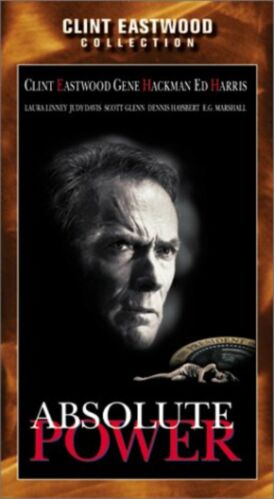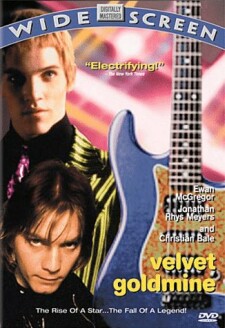Absolute Power
Absolute Power is a typical product of the Clint Eastwood line of knock-off existentialist heroes: a vehicle, that is, for yet another mythologization of the high-plains-drifter/man-with-no-name anti-hero whom neither old Clint nor his devoted audience ever seems to get tired of. I got tired of it myself a long time ago, so I should probably recuse myself from consideration of this movie—but for the fact that there are one or two interesting new wrinkles in the familiar fabric.
The typically preposterous story has Eastwood as a fabled cat burglar called Luther Whitney who is filling his burglar’s bag with the contents of a very rich man’s vault when he sees, through the two way mirror that conceals it, the rich man’s wife (Melora Hardin) and the president of the United States (Gene Hackman) engaging in rough sex in the bedroom. When the drunken lady resents the drunken President’s slapping her around, they start fighting in earnest. She gets hold of a letter opener with which she is about to kill him when two Secret Service agents (Scott Glenn and Dennis Haysbert) burst in and shoot her dead. Luther, in the vault, sees the whole thing, including the coverup which is managed by the President’s chief of staff, Gloria Russell (Judy Davis).
But—and this is the kind of thing that only happens in movies—in cleaning up the crime scene they drop the incriminating letter opener, which has both the dead woman’s and the President’s prints on it and the latter’s blood (from when she stabbed him in the arm). Oops! Luther pops out of his hiding place and snaffles it. Unwilling to stick around with such incriminating and deadly knowledge and having made a $5 million haul, Luther makes plans to go abroad permanently. But first he has to visit his only daughter, Kate (Laura Linney), who you will be amazed to learn is estranged from her father because he spent most of her youth in prison. Even more amazing is the fact that he still feels great love and tenderness towards her and has, unbeknownst to her, been shyly present at most of the great moments in her life.
What do you suppose are the chances for a reconciliation between the two?
Their first interview, designed to establish Kate’s hostility and Luther’s unrequited solicitude, takes place at a beach where she jogs—after parking her car on some dangerous cliffs. You might want to file those cliffs for future reference. When she rejects him, he proceeds with his plan to escape abroad. He gets as far as the airport when he sees the President doing a nauseatingly hypocritical double act on national television with the distraught widower, Walter Sullivan (E.G. Marshall), who is such a big contributor that he is said to have made him president. Luther says to himself: “You heartless whore; I’m not about to run from you.” And he does not, though both the Secret Service and Sullivan’s own hired killer are now out to get him. Even worse, when not one but two sharpshooting hitmen miss their shots at him, the bad guys turn their homicidal attentions to his charming daughter.
Well, you can guess most of the rest. The good policeman (Ed Harris) is kept in the dark by the Secret Service and the White House, who use him and bug his phone, but he gradually closes in on the real killers anyway, at the same time he is falling in love with the beauteous young Miss Whitney, a federal prosecutor who has agreed to help him by bringing in her father. It will come as no surprise that Luther outsmarts the feds, or that, except for the remorse-stricken agent played by Scott Glenn, the latter all conform to movie stereotype. When the president orders the Secret Service to kill Miss Whitney, he says: “Let’s get crackin’, boys. Show that you love your country.” Later, one of the killers, having walked into Luther’s trap, says: “My President, right or wrong.” These are bad people.
Now for the two interesting things. One is that Luther decides in the end to put all the loot he stole from old man Sullivan back. Apparently the spectacle of his president getting up to some awful things has scared him straight. The second is that (and here I must give away the ending), after the 86 year old Sullivan improbably butchers the much younger President, the cover-up continues. He announces that, on an ordinary social visit, his old friend had suddenly and inexplicably decided to commit suicide in his presence—with the letter opener. Even Bill Clinton might be embarrassed to tell so obvious a falsehood, but this becomes the official version of events. It is a gratuitous display of official duplicity and cynicism, connived at by the police and the president’s staff for no apparent reason.
So on the one hand the existential hero, a lone wolf and gentleman-thief, is turning honest, also for no apparent reason, and on the other society’s official classes are even more corrupt than paranoia can imagine. They lie even when there is no reason to, even when they have nothing to gain by it. Go figure. But welcome to the movies!
Discover more from James Bowman
Subscribe to get the latest posts to your email.







